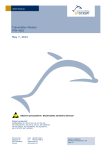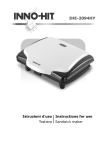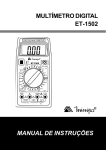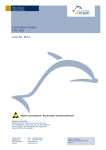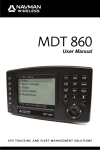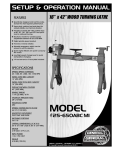Download Fisher 13-986-133G/GR/GA 13-986-133GHK User's Manual
Transcript
Instruction Manual Fisher Scientific Isotempâ Chromatography and General Purpose Laboratory Refrigerators Chromatography Refrigerator Models 13-986-127G/GR/GA 13-986-127GHK 13-986-133G/GR/GA 13-986-133GHK 13-986-138G/GR/GA 13-986-138GHK 13-986-145G/GR/GA 13-986-145GHK 13-986-149G/GR/GA 13-986-149GHK 13-986-172G/GR/GA 13-986-172GHK General Purpose Laboratory Refrigerator Models 13-986-227R/G/RR/RA/GR/GA 13-986-227GHK 13-986-238G/GR/GA 13-986-238GHK 13-986-245G/GR/GA 13-986-245GHK 13-986-249R/G/RR/RA/GR/GA 13-986-249GHK 13-986-272G/GR/GA 13-986-272GHK Service Division (Repairs): 1-800-395-5442 Technical Support: 1-800-926-0505 Customer Service: 1-800-766-7000 Prior to calling for service, have the following information readily available: Catalog Number: Serial Number: Date of Purchase: The catalog number and serial number can be found on the data plate located on the left interior wall of the unit. Part Number: 104416 Table of Contents Isotemp Chromatography/ Laboratory Refrigerators Introduction.................................................................................................................................... 1 Unpacking ...................................................................................................................................... 1 Visible Loss or Damage............................................................................................................. 1 Concealed Loss or Damage ..................................................................................................... 1 Packing List ................................................................................................................................. 1 Installation...................................................................................................................................... 2 Selecting a Location................................................................................................................... 2 Leveling the Unit ......................................................................................................................... 2 Door Handles .............................................................................................................................. 2 Door Removal and Adjustment ................................................................................................ 2 Shelves......................................................................................................................................... 3 Electrical Connection ................................................................................................................. 4 Operation ........................................................................................................................................ 5 Control Layout............................................................................................................................. 5 Temperature Controller.............................................................................................................. 6 Setting the Temperature ....................................................................................................................................6 Units Select ............................................................................................................................................................6 Calibration Offset ................................................................................................................................................6 Hold-Off Time ......................................................................................................................................................7 Error Codes ................................................................................................................................. 7 Fluorescent Lamps..................................................................................................................... 8 Convenience Outlet.................................................................................................................... 8 Manual/Automatic Condenser Fan .......................................................................................... 8 Trouble Shooting Table .............................................................................................................. 9 Maintenance................................................................................................................................. 10 Cabinet Cleaning ...................................................................................................................... 10 Cleaning the Condenser.......................................................................................................... 10 Condensate Evaporator Pan .................................................................................................. 10 Replacement Parts..................................................................................................................... 11 Performance Characteristics .................................................................................................. 11 Power Requirements ................................................................................................................. 11 Wiring Diagram ........................................................................................................................... 12 Part Number: 104416 Page 1 of 12 Introduction Isotempâ Laboratory and Chromatography Refrigerators Your satisfaction and safety are important to Fisher Scientific, a complete understanding of this unit is necessary to attain these objectives. As the ultimate user of this apparatus, it is your responsibility to understand its proper function and operational characteristics. This instruction manual should be thoroughly read and all operators given adequate training before attempting to place this unit in service. Awareness of the stated cautions and warnings, and compliance with recommended operating parameters – together with maintenance requirements – are important for safe and satisfactory operation. The unit should be used for its intended application; alterations or modifications will void the Warranty. WARNING: As a routine laboratory precaution, always wear safety glasses when working with this apparatus. Unpacking This product is not intended, nor can it be used, as a sterile or patient connected device. In addition, this apparatus is not designed for use in Class I, II or III locations as defined by the National Electrical Code, unless otherwise noted. Save all packing material if apparatus is received damaged. This merchandise was carefully packed and thoroughly inspected before leaving our factory. Responsibility for its safe delivery was assumed by the carrier upon acceptance of the shipment; therefore, claims for loss or damage sustained in transit must be made upon the carrier by the recipient as follows: Visible Loss or Damage Concealed Loss or Damage Note any external evidence of loss or damage on the freight bill, or express receipt, and have it signed by the carrier’s agent. Failure to adequately describe such external evidence of loss or damage may result in the carrier’s refusing to honor your damage claim. The form required to file such a claim will be supplied by the carrier. Concealed loss or damage refers to loss or damage, which does not become apparent until the merchandise has been unpacked and inspected. Should either occur, make a written request to the carrier’s agent within 15 days of the delivery date; then file a claim with the carrier since the damage is the carrier’s responsibility. If you follow the above instructions carefully, we will guarantee our full support of your claim to be compensated for loss from concealed damage. DO NOT – FOR ANY REASON – RETURN THIS UNIT WITHOUT FIRST OBTAINING AUTHORIZATION Packing List Part Number: 104416 The following items are packed in the envelope located inside the refrigerator chamber. If any of the following items are not present, report the missing item to your local Fisher representative. 1. Warranty Card 5. Chart Recorder Instructions 2. This Instruction Manual 3. Door Lock Key 4. Power Switch Key Isotempâ Laboratory and Chromatography Refrigerators Installation Selecting a Location Leveling the Unit Choose a location for the refrigerator that will provide at least three inches of clearance between the cabinet and any adjacent vertical surface at the sides and rear. Appropriate electrical power must be available. Locate the refrigerator within 6 feet of the power outlet so that no extension cord is required. The refrigerator must be level in order to provide adequate condensation drainage as well as proper door alignment and operation. The refrigerator should be in its final operating location and set so that it is firmly positioned on the floor. There are four leveling screws, one on each corner. . Level the cabinet front to rear and sideto-side using the corner leveling screws. The leveling screws are accessed by removing the base grille, as described below: 1. 2. 3. 4. Door Handles Door Removal and Adjustment Page 2 of 12 Remove the lower grille attaching screws. Grasp the grille with both hands. Tilt the lower end of the base grille toward you. Pull grille away from the refrigerator (Swinging Door Models Only) Door handles are packed inside each refrigerator. To mount the handle, lift the door gasket behind the two screws on the front of the door. Attach handle with offset away from the cabinet corner and tighten the screws. (Sliding Door Models Only) Each door has its own closing spring located at the top of the door track. Each spring is set for proper tension. If adjustment is required: 1. Check for cabinet level (see above). 2. Remove the door(s) by lifting it and sliding about half way open. The roller will fall into a gap in the upper track. While maintaining upward pressure on the door, pull the bottom outward until it clears the bottom track. 3. Adjust the location of the door rollers in the roller brackets (above door) as shown by loosening the lock nut on the back of the roller bracket and moving the roller up or down. Closing spring Lock nut on back Roller Fig. 1 Part Number: 104416 Isotempâ Laboratory and Chromatography Refrigerators Page 3 of 12 4. The spring tension can be adjusted by moving the spring to the outside hole of the bracket or by snipping a portion of it off and then refastening it to the bracket. CAUTION: Where safety glasses before snipping spring. Shelves Shipped inside each cabinet are shelves packed in plastic and a bag of shelf supports. Two different types of shelf supports are used. The shelf supports have tab lengths of ¼ inch and ½ inch. The ¼ inch versions are used in the front of the shelf (See below) and the ½” shelf supports are used in the rear. Shelf spacing is adjustable to suit user requirements. Insert four shelf supports for each shelf into the pilasters as shown. Note the numbers on the pilasters. Place supports on the same numbers on each pilaster to ensure the shelf will be level. Place the shelf on the pilasters as shown in Fig’s 2 and 3. Replacement shelves are available individually. See page 11 for shelf part numbers. Proper shelf orientation is illustrated in Figure 2. NOTE: Chromatography units include additional ½ shelves, which can be used in place of the full shelves. Shelf Support Tab Length Fig. 2 Part Number: 104416 Use ¼” tab length supports on sides and ½’ in back. Isotempâ Laboratory and Chromatography Refrigerators Fig. 3 Electrical Connection Page 4 of 12 Place shelves at desired height on four shelf supports. NOTICE: Insufficient line voltage is often the cause of compressor start-up failure. It is strongly recommended that a dedicated circuit, conforming to the National Electrical Code, Article 440, be used for powering the refrigerator. CAUTION: Be sure that the power supply is the same voltage that is specified on the refrigerator’s data plate. The frequency and nominal voltage requirements for the unit are specified on the data plate, which is located on the interiors upper left side. Only plug the unit into a power source that meets these requirements. Low line voltage is often the cause of service complaints. With the unit running, check that the line voltage is within ±10% of that specified on the data plate. WARNING: For personal safety this unit must be properly grounded. The power cord of this instrument is equipped with a three prong (grounding) plug (NEMA 5-15P). This plug mates with a standard three prong (grounding) wall receptacle (NEMA 5-15R) to minimize the potential of an electrical shock hazard. Chromatography models are equipped with a (NEMA 5-20P). This plug must mate with a (NEMA 5-20R). Part Number: 104416 Page 5 of 12 Isotempâ Laboratory and Chromatography Refrigerators The customer should have the wall receptacle and circuit checked by a qualified electrician to verify the receptacle is properly grounded and meets power requirements specified on the data plate. WARNING: DO NOT under any circumstances cut or remove the third (ground) prong from the power cord. DO NOT use a two-prong adapter plug. Where a two prong wall receptacle is encountered, it is the personal responsibility and obligation of the user to have it replaced with a properly grounded three prong receptacle. CAUTION: Do not use an extension cord. Use of an ungrounded cord or an overloaded circuit VOIDS the compressor warranty. Operation WARNING: If the unit is tilted in excess of 30 degrees, level the unit then wait at least 12 hours before applying power to it. WARNING: This product is not approved for storage of flammable or explosive materials. Also, it is not approved for use in hazardous locations containing explosive atmospheres. Control Layout Part Number: 104416 Before operation, become familiar with the refrigerator controls located on the refrigerator header panel. A layout of the control is given below. Isotempâ Laboratory and Chromatography Refrigerators Page 6 of 12 Begin operation by inserting the key into the key switch located on the header panel. The key switch is packed inside the envelope, which is shipped in the refrigerator chamber. Turning the key switch to the ON ( | ) position will energize the evaporator fans and the digital controller. Temperature Controller The digital temperature controller is located on the left side of the header panel (See Figure 4). When the unit is initially turned on, the display will indicate current chamber temperature. The temperature units will be indicated by the °C or °F LED located just to the right of the temperature display. The refrigerator is factory set at 4°C. When the unit is first energized the evaporator fans will operate however it will not immediately cool. A 3-minute compressor delay is programmed into the controller to provide sufficient time for the evaporator to defrost and to allow the system pressure time to equalize. When the delay time is over, the Cool LED will illuminate, the compressor will run and the chamber will cool. NOTE: The compressor requires a 3-minute delay time between activations. The unit will not cool during this delay. The delay is also activated when the controller is first energized. Setting the Temperature Units Select Calibration Offset Part Number: 104416 To change the set temperature, press and release the Menu keypad once. The display will flash SP and the Mode LED will be illuminated. The last set temperature will then be shown in the display. To change the temperature, press the UP or DOWN arrow key. The adjustable temperature range is 1 to 12°C (34 to 54°F). When the desired set temperature is displayed, press the Menu keypad to enter the set temperature and activate the Units Select menu. The second menu selects the units. The refrigerator control displays temperature in °C or °F. The factory setting is °C. Starting from the temperature display mode (Mode LED off), press the Menu key twice. The current temperature units are displayed. To switch between units, press the UP or DOWN arrow key then press the Menu key to select. The unit LED will be displayed on the right of the temperature display. In the event the refrigerator needs to be calibrated, a simple routine is available to adjust the display and control point to a referenced standard. To set a temperature offset, press and hold the Menu keypad for 5 seconds. The display will flash oS followed by the last temperature offset value. The factory setting is 0. To change the offset value, press the UP or DOWN arrow key, then press the Menu key. The value shown in the display will be added to the previous temperature reading. The display will then flash Ho. Isotempâ Laboratory and Chromatography Refrigerators Page 7 of 12 For Example: The display indicates 4°C but a reference thermometer in the refrigerator chamber indicates 6°C. The operator presses and holds the Menu keypad for 5 seconds, then changes the display value from 0 to +2 by using the UP arrow key. Press the Menu key again. Now the display indicates a chamber temperature of °6 C and the controller begins to cool (as long as 3-min. delay period has expired) to the desired temperature of 4°C as shown on the reference thermometer. Allow an additional 30 to 40 minutes for the refrigerator to again stabilize. If the display is still inaccurate, repeat the calibration offset procedure. CAUTION: INCREASING the offset value DECREASES the temperature at which the system controls. If the offset is inadvertently set too high, the chamber’s control temperature can fall below zero and cause evaporator freeze-up. This is caused by the evaporator temperature not rising above 0°C and not defrosting during the compressor “off cycle”. NOTE: While in any of the controller mode setups (temp set, calibration offset or units), the controller will wait 15 seconds for a new value to be entered. If there is no keypad operation within the 15-second time window, control will automatically revert to the temperature display mode and the Mode LED will turn off. Hold-Off Time Following the offset menu is the hold-off (Ho) menu. The display will momentarily flash “Ho”, followed by a number. The number shown is the delay time in minutes between compressor activations. Use the UP/DOWN keypads to change the value. Increasing the hold-off time will allow additional time for the evaporator to defrost during the off-cycle. This can reduce the chance of evaporator freeze-up during times of high humidity. Pressing the Menu keypad while in the Ho mode, enters the hold-off time displayed, and returns controller operation to the temperature display mode. Error Codes Error codes indicate when the controller is sensing a problem. A description of each is given below. See the Troubleshooting Table for additional information on error codes. E1 E2 E3 Part Number: 104416 Open sensor. Under temperature. Temperature at sensor is less than –36°C. Over temperature. Temperature at sensor is greater than 37°C. Isotempâ Laboratory and Chromatography Refrigerators Page 8 of 12 Fluorescent Lamps The interior lamp is controlled by a rocker switch on the header panel. This light may be operated any time the cabinet power is turned on at the keyed power switch. If the interior lamp fails, replace with the same size and wattage lamp. DO NOT USE REDUCED WATTAGE LAMPS. The reduced wattage lamps generally fail to light below 60 °F (15 °C). Convenience Outlet Chromatography Refrigerators come equipped with a convenience outlet located in the center of the back wall. Model 172G’s (three doors) have two convenience outlets. The total power that can be supplied by the outlet (or outlets in 3-door models) is 5A @ 120VAC (4A @ 120VAC for the 3-door models). The outlet(s) is protected by a circuit breaker located just below and to the right of the outlet(s). Pressing the breaker button resets the breaker after a fault. (Chromatography Refrigerators Only) WARNING: The convenience outlet is LIVE at any time the unit is connected to an electrical power source, regardless of the position of the key switch. Manual/Automatic Condenser Fan A rocker switch located on the left side of the top of the inside of the chamber is used to operate the condenser fan automatically or manually. With the switch in the automatic position, the condenser fan operates with the compressor. In the manual position, the condenser fan operates continuously. During times of high ambient relative humidity conditions, more water is condensed on the evaporator and directed to the condensate pan. The condenser fan will run continuously in the manual setting to better dispose of this water. At times of low relative humidity, the switch can be set to automatic. Part Number: 104416 Isotempâ Laboratory and Chromatography Refrigerators Page 9 of 12 Trouble Shooting Table This table is intended to assist in resolving user-correctable Refrigerator problems by relating symptoms to their likely causes. If service beyond the scope of this table is required, contact Fisher Scientific Service Division @ 1-800-395-5442. Symptom Does Not Run Action Plug in Unit Blown fuse or tripped circuit breaker. Check fuse or circuit breaker at breaker box. Defrost unit. Increase Ho time. Runs Continuously Frost buildup on refrigeration coils Clicking Sound The compressor is equipped with a thermal protector. This device shuts off the compressor when it becomes to hot. A clicking sound occurring about every 30 seconds indicates this protector is working Set temp is to high Disconnect power and call for service. Condenser coil dirty Clean condenser coil with a vacuum cleaner Unit frosted Open sensor Defrost unit Check sensor connection Under Temp Temperature at sensor is less than –36°C or sensor is malfunctioning. Temperature at sensor is greater than 37°C or sensor is malfunctioning Insufficient Cooling Display shows E1 (error code) Display shows E2 (error code) Display shows E3 (error code) Part Number: 104416 Probable Cause Unit Unplugged Over Temp Reduce temperature setting, verify Cool LED is on. Isotempâ Laboratory and Chromatography Refrigerators Maintenance Cabinet Cleaning Page 10 of 12 CAUTION: When servicing the unit, disconnect from the electrical power source The cabinet interior should be cleaned frequently. Any spilled liquid should be wiped off immediately. Stains resulting from some spills can be permanent if not quickly removed. The most convenient time to clean the interior is after defrosting. The cabinet exterior should be cleaned occasionally. A mild detergent and lukewarm water or a solution of bicarbonate of soda (1 tablespoon per gallon of water) is recommended for cleaning the interior and exterior of the cabinet. All surfaces should be rinsed and thoroughly dried. CAUTION: Do not use any type of abrasive such as steel wool, or fluids such as gasoline, Naphtha, or thinner. These materials could be harmful to plastic materials, door gasket, and painted surfaces. Cleaning the Condenser For efficient operation, it is recommended that the condenser coil and fan be cleaned every 4 to 6 months.. The condenser coil is located behind the base grille, at the bottom of the unit.. See Leveling the Unit for instructions on removing the base grille. Vacuum clean the front surface of the coil thoroughly, or direct forced air through the condenser from the rear. If necessary, use a stiff bristled brush to loosen any dirt. Failure to keep the condenser clean will void the warranty. Caution: Accessing and cleaning the condenser coil or evaporator pan should be done by qualified personnel. Condensate Evaporator Pan Part Number: 104416 The condensate evaporator pan is located behind the base grill between the condenser fan and compressor. This pan should be cleaned at least once a year to prevent foul odors and operate efficiently. Vacuum clean if dry, or sponge clean with soapy water. Isotempâ Laboratory and Chromatography Refrigerators Page 11 of 12 Replacement Parts Replacements for Laboratory Refrigerator parts serviceable by the user may be ordered, by part number, from Fisher Scientific Co. @ 1-800-766-7000. Item Part Number Shelves Model 127/227 Model 133/233 Model 138/238 Model 145/245 Model 149/249 & 172/272 ½ Shelves Model 127/227 Model 133/233 Model 138/238 Model 145/245 Model 149/249 & 172/272 13-986-210A 13-986-210B 13-986-210U 13-986-210C 13-986-210D 13-986-210F 13-986-210G 13-986-210T 13-986-210H 13-986-210J Solid State Relay (K1) Temperature Controller International Version Controller (220V) Condenser Pan Wick Front Shelf Support Rear Shelf Support Performance Characteristics Power Requirements Temperature Range: 1° to 12°C (34° to 54°F) Temperature Stability: +/- 3°C Catalog Number 13-986-127G/GR/GA 13-986-133G/GR/GA 13-986-138G/GR/GA 13-986-145G/GR/GA 13-986-149G/GR/GA 13-986-172G/GR/GA 13-986-227G/GR/GA 13-986-227R/RR/RA 13-986-233G/GR/GA 13-986-238G/GR/GA 13-986-245G/GR/GA 13-986-249G/GR/GA 13-986-249R/RR/RA 13-986-272R/RR/RA Part Number: 104416 SPN88616 SPN103508 SPN105402 SPN104433 SPN103264 SPN103265 Volts(+/-10%) 115 115 115 115 115 115 115 115 115 115 115 115 115 115 Amps Hz 13.5 16.0 16.0 16.0 16.0 16.0 8.5 8.5 10.5 10.5 10.5 10.5 10.5 12.0 60 60 60 60 60 60 60 60 60 60 60 60 60 60 Part Number: 104416 Wiring Diagram Convenience Outlet, Chromatography Refrigerators Only Page 12 of 12 Isotempâ Laboratory and Chromatography Refrigerators Part No. 104416 Rev G Isotemp Laboratory Refrigerators Published 10 – 2003 Fisher Scientific Co. 2000 Park Lane Pittsburgh, PA 15275


















